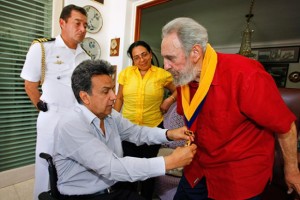Carlos Sánchez Berzaín
february 13, 2018
 (Interamerican Institute for Democracy) Results from the 4 February referendum and popular consult in Ecuador reflect the unequivocal mandate of the people for the government to restore democracy. It is not an ideological matter, it is about reinstating those components that Rafael Correa and his government had suppressed, just as they did in Venezuela, Bolivia, and Nicaragua within a model that Ecuador’s former President Osvaldo Hurtado had denounced as the “dictatorships of the 21st century socialism”. Ecuador’s current president Lenin Moreno is stronger but there is doubt whether he wants and is able to remove Ecuador from the Castroist-Chavist dictatorships’ group.
(Interamerican Institute for Democracy) Results from the 4 February referendum and popular consult in Ecuador reflect the unequivocal mandate of the people for the government to restore democracy. It is not an ideological matter, it is about reinstating those components that Rafael Correa and his government had suppressed, just as they did in Venezuela, Bolivia, and Nicaragua within a model that Ecuador’s former President Osvaldo Hurtado had denounced as the “dictatorships of the 21st century socialism”. Ecuador’s current president Lenin Moreno is stronger but there is doubt whether he wants and is able to remove Ecuador from the Castroist-Chavist dictatorships’ group.
Let us remember that “Castroist-Chavist” is the label for “Fidel Castro and Hugo Chavez’s undertaking that, using the subversive capabilities of the Cuban dictatorial regime and Venezuelan oil, had resurrected -commencing in 1999- the expansion of Castroist, antidemocratic communism with a heavy antiimperialist discourse.” With lots of funds and lots of crime, it was spread through the region to the point that -at its peak- it controlled the majority of member states from the Organization of American States (OAS) and the OAS itself. The Castroist-Chavist system is now in crisis, yet it still controls Cuba, Venezuela, Bolivia, and Nicaragua and has influence over the Petro-Caribbean countries. There are signs, however, that Ecuador may exit from this group.
When Rafael Correa got to power and was elected President of Ecuador on 15 January of 2007, he subjected his country under the Caracas-Havana axis. Components of democracy gradually disappeared through; the institutionalized violation of human rights and individual freedoms, his total control of the branches of government, his misuse of the judicial branch as a means for repression, political persecution, and seizure, the disappearance of the “Rule of Law”, the existence of political persecutions, imprisonments, and exiles, as well as his total control of mass media, and the annulment of the freedom of the press. Correa institutionalized electoral fraud, openly supported narco-terrorist groups, such as the FARC, eliminated public control and allowed corruption to be widespread; abused indigenous natives and their territories, misappropriated national resources, and called for his indefinite reelection and more.
On 24 May of 2017, Correa left the government in the hands of his “dolphin” acolyte Lenin Moreno. An Ecuadorean nation in economic crisis, overly in debt, without a clear determination of the amount, with politically persecuted, imprisoned, and exiles, with denouncements of electoral fraud, and the deliberate coverup of corruption, and with unprecedented impunity, without freedom of the press, discharging his duties in the typical fashion of a Castroist-Chavist dictatorship. It was, perhaps, this shameful and bitter reality that made Lenin Moreno to challenge himself to truly be the president of Ecuador instead of being the successor and concealer of Rafael Correa’s dictatorship, and to seek change through the referendum and popular consult.
Now that Lenin Moreno’s political standing has been boosted and he has received the people’s mandate -which has surpassed the two-thirds of votes in average- to restore democracy in Ecuador, the question remains as to whether he wants it and is able to do it. The question also remains as to whether the political circles of the Post-Correa regime will allow this to happen and whether or not Moreno will be neutralized by the international threat of the Castroist-Chavist system. Moreno’s discourse is interesting but members of his government do not take action and as a result his relationship with the dictatorships keep him under suspicion and his foreign policy continues to be that of Correa.
This is not an ideological matter because neither Lenin Moreno, nor his government, nor anyone need to stop being leftists, or progressives, in order to be democratic and fulfill the intent of the Interamerican Democratic Charter, the Universal Declaration of Human Rights, and the Constitution. It is neither a rightist nor a leftist thing to return under the Rule of Law, to respect the separation and independence of the branches of government, to free political prisoners, to cease persecutions, to promote the return of exiles, to respect the freedom of the press.
It is neither an ideological matter to remove Ecuador from the ever-shrinking group of governments concealing their dictatorship in Cuba, Venezuela, Bolivia, and Nicaragua. The dictatorships of the Castro’s in Cuba, Nicolas Maduro in Venezuela, Evo Morales in Bolivia, and the Ortega’s in Nicaragua represent narcotics trafficking, terrorism, forced migration, exile, crisis, control of power by organized thugs and that is definitely NOT politics, it is organized crime. When we deal with crime, there are no rightists or leftists, only criminals and President Lenin Moreno now has the opportunity of not remaining trapped by the Castroist-Chavist criminal plot.
Published in Spanish by Diario las Americas on Sunday February 11th, 2018.
Translated from Spanish by: Edgar L. Terrazas, member of the American Translators Association, ATA # 234680.
 Carlos Sanchez Berzain Abogado | Estadista | Político | Politólogo
Carlos Sanchez Berzain Abogado | Estadista | Político | Politólogo
